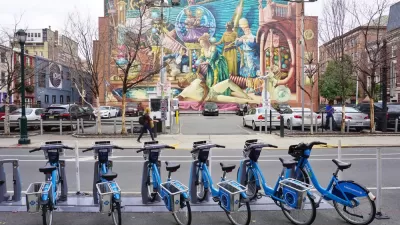Indego will officially launch this spring with over 60 stations and 600 bikes. The city is already making plans to expand the system after its initial launch.
According to an article by Paul Nussbaum, "Philadelphia will launch an ambitious bike-sharing system in spring in at least 60 locations, from Temple University to the Navy Yard and from the Delaware River to University City."
"The program, dubbed Indego because of an $8.5 million contribution from Independence Blue Cross, will allow riders to use credit cards, cash, or member cards to rent bikes 24 hours a day."
Hussbaum provides as many of the details about financing as the city made available, including the funding for implementation and operations: "Independence Blue Cross will contribute $1.7 million a year for five years to help operate the system, while the city will provide $3 million to buy bikes and stations, and more than $4.5 million in additional funding will come from state, federal, and foundation coffers." Pricing has not yet been announced, but various possible pricing schemes should average out to about $5 an hour, according to the article.
Also, Indego "will be operated by Bicycle Transit Systems Inc. of Philadelphia. Bicycle Transit Systems has operated bike-share programs in Chicago, Boston, and Washington."
The system also launched an official website.

Maui's Vacation Rental Debate Turns Ugly
Verbal attacks, misinformation campaigns and fistfights plague a high-stakes debate to convert thousands of vacation rentals into long-term housing.

Planetizen Federal Action Tracker
A weekly monitor of how Trump’s orders and actions are impacting planners and planning in America.

San Francisco Suspends Traffic Calming Amidst Record Deaths
Citing “a challenging fiscal landscape,” the city will cease the program on the heels of 42 traffic deaths, including 24 pedestrians.

Defunct Pittsburgh Power Plant to Become Residential Tower
A decommissioned steam heat plant will be redeveloped into almost 100 affordable housing units.

Trump Prompts Restructuring of Transportation Research Board in “Unprecedented Overreach”
The TRB has eliminated more than half of its committees including those focused on climate, equity, and cities.

Amtrak Rolls Out New Orleans to Alabama “Mardi Gras” Train
The new service will operate morning and evening departures between Mobile and New Orleans.
Urban Design for Planners 1: Software Tools
This six-course series explores essential urban design concepts using open source software and equips planners with the tools they need to participate fully in the urban design process.
Planning for Universal Design
Learn the tools for implementing Universal Design in planning regulations.
Heyer Gruel & Associates PA
JM Goldson LLC
Custer County Colorado
City of Camden Redevelopment Agency
City of Astoria
Transportation Research & Education Center (TREC) at Portland State University
Jefferson Parish Government
Camden Redevelopment Agency
City of Claremont



























